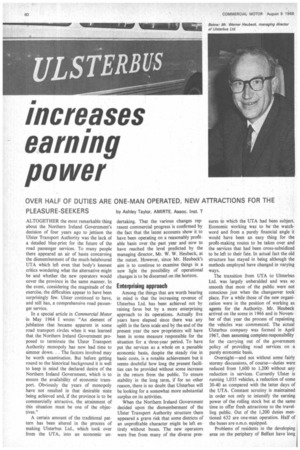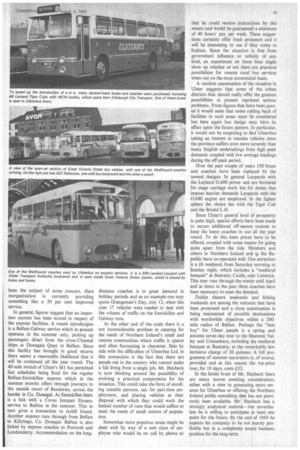increases earning power
Page 62

Page 63

If you've noticed an error in this article please click here to report it so we can fix it.
OVER HALF OF DUTIES ARE ONE-MAN OPERATED, NEW ATTRACTIONS FOR THE
PLEASURE-SEEKERS by Ashley Taylor. AMIRTE, Assoc. Inst. T
ALTOGETHER the most remarkable thing about the Northern Ireland Government's decision of four years ago to jettison the Ulster Transport Authority was the lack of a detailed blue-print for the future of the road passenger services. To many people there appeared an air of haste concerning the dismemberment of the much-belaboured UTA which left even that body's keenest critics wondering what the alternative might be and whether the new operators would cover the province in the same manner_ In the event, considering the magnitude of the exercise, the difficulties appear to have been surprisingly few. Ulster continued to have, and still has, a comprehensive road passenger service.
In a special article in Commercial Motor, in May 1964 I wrote: "An element of jubilation that became apparent in some road transport circles when it was learned that the Northern Ireland Government proposed to terminate the Ulster Transport Authority monopoly has now had time to simmer down. . . The factors involved may be worth examination. But before getting round to the historical background it is well to keep in mind the declared desire of the Northern Ireland Government, which is to ensure the availability of economic transport. Obviously the years of monopoly have not resulted in that desirable state being achieved and, if the province is to be commercially attractive, the attainment of this situation must be one of the objectives."
A certain amount of the traditional pattern has been altered in the process of making Ulsterbus Ltd., which took over from the UTA, into an economic un
dertaking. That the various changes represent commercial progress is confirmed by the fact that the latest accounts show it to have been operating on a reasonably profitable basis over the past year and now to have reached the level predicted by the managing director, Mr. W. W. Heubeck, at the outset. However, since Mr. Heubeck's aim is to continue to examine things in a new light the possibility of operational changes is to be discerned on the horizon.
Enterprising approach
Among the things that are worth bearing in mind is that the increasing revenue of Ulsterbus Ltd. has been achieved not by raising fares but by a more enterprising approach to its operations. Actually five years have elapsed since there was any uplift in the fares scale and by the end of the present year the new proprietors will have been in some measure responsible for the situation for a three-year period. To have put the services as a whole on a passable economic basis, despite the steady rise in basic costs, is a notable achievement but it seems doubtful how long the present facilities can be provided without some increase in the return from the public. To ensure stability in the long term, if for no other reason, there is no doubt that Ulsterbus will be looking for a somewhat more substantial surplus on its activities.
When the Northern Ireland Government decided upon the dismemberment of the Ulster Transport Authority structure there appeared a grave risk that some districts of an unprofitable character might be left entirely without buses. The new operators were free from many of the diverse pres
sures to which the UTA had been subject. Economic working was to be the watchword and from a purely financial angle it would have been an easy thing for the profit-making routes to be taken over and the services that had been cross-subsidized to be left to their fate. In actual fact the old structure has stayed in being although the methods employed have changed in varying ways.
The transition from UTA to Ulsterbus Ltd. was largely unheralded and was so smooth that most of the public were not conscious just when the changeover took place. For a while those of the new organization were in the position of working as agents for the Authority. Mr. Heubeck arrived on the scene in 1966 and in November of that year the process of repainting the vehicles was commenced. The actual Ulsterbus company was formed in April 1967, then assuming complete responsibility for the carrying out of the government policy of providing road services on a purely economic basis.
Overnight—and not without some fairly stormy discussions, of course—duties were reduced from 1,600 to 1,200 without any reduction in services. Currently Ulster is running 1,035 vehicles, a reduction of some 30-40 as compared with the latter days of the UTA. Constant scrutiny is maintained in order not only to intensify the earning power of the rolling stock but at the same time to offer fresh attractions to the travelling public. Out of the 1,200 duties mentioned 632 are one-man operation. Half of the buses are o.m.o. equipped.
Problems of residents in the developing area on the periphery of Belfast have long been the subject of some concern. Here reorganization is currently providing something like a 30 per cent improved service.
In general, figures suggest that an important success has been scored in respect of the express facilities. A recent introduction is a Belfast-Galway service which at present operates in the summer only, picking up passengers direct from the cross-Channel ships at Donegale Quay in Belfast. Since this facility has brought in good returns there seems a reasonable likelihood that it will be continued all the year round. The 40-mile stretch of Ulster's M1 has permitted fast schedules being fixed for the regular Belfast-Enniskillen express which in the summer months offers through journeys to the seaside resort of Bundoran, across the border in Co. Donegal. At Enniskillen there is a link with a Covas Iompair Eireann service to Ballina in the summer. This in turn gives a connection to Achill Island. Another express runs through from Belfast to Killybegs, Co. Donegal. Belfast is also linked by express coaches to Portrush and Londonderry. Accommodation on the long
distance coaches is in great demand in holiday periods and as an example one may quote Orangeman's Day, July 12, when this year 17 vehicles were needed to deal with the volume of traffic on the Enniskillen and Galway runs.
At the other end of the, scale there is a not inconsiderable problem in catering for the needs of Northern Ireland's small and remote communities where traffic is sparse and often fluctuating in character. Side by side with the difficulties of Ulsterbus Ltd. in this connection is the fact that there are people out in the country who cannot make a full living from a single job. Mr. Heubeck is now thinking around the possibility of evolving a practical compromise for the situation. This could take the form of enrolling suitable persons, say for part-time employment, and placing vehicles at their disposal with which they could work the limited number of runs that would suffice to meet the needs of small centres of population.
Somewhat more populous areas might be dealt with by way of a new class of employee who would be on call by phone so that he could receive instructions by this means and would be guaranteed a minimum of 40 hours' pay per week. These suggestions certainly offer fresh prospects and it will be interesting to see if they come to fruition. Since the situation is free from government influence or subsidy of any kind, an experiment on these lines might show up whether or not there are practical possibilities for remote rural bus services when run on the most economical basis.
A random examination of the situation in Ulster suggests that some of the urban districts that should really offer the greatest possibilities at present represent serious problems. From figures that have been quoted it Would seem that some cutting back of facilities in such areas must be considered but here again bus design may have its effect upon the future pattern. In particular, it would not be surprising to find Ulsterbus taking an interest in standee vehicles since the province suffers even more severely than many English undertakings from high peak demands coupled with low average loadings during the off-peak period.
Over the past couple of years 150 buses and coaches have been replaced by the newest designs. In general Leopards with the Leyland 0.600 power unit are favoured for stage carriage work but fc# duties that impose heavier demands Leopards with the 0.680 engine are employed. In the lighter sphere the choice lies with the Tiger Cub and the Bristol L.H.
Since Ulster's general' level of prosperity is quite high, special efforts have been made to secure additional off-season custom to keep the latest coaches in use all the year round. To do this keen prices have to be offered, coupled with some reason for going quite apart from the ride. Hoteliers and others in Northern Ireland and 19 the Republic have co-operated well. One attraction is a £6 weekend, from Saturday morning to Sunday night, which includes a "medieval banquet" at Bunratty Castle, near Limerick. This tour runs through the winter until April and at times in the past three coaches have been necessary to meet the demand.
Dublin theatre weekends and fishing weekends are among the ventures that have been promoted and a close examination is being maintained of possible destinations with worthwhile objectives within a 200mile radius of Belfast. Perhaps the "best buy" for Ulster people is a spring and autumn seven-day tour to the Shannon Valley and Connemara, including tie medieval banquet at Bunratty, at the rem, rkably low inclusive charge of 20 guineas. A full programme of summer excursions is, of course, provided and at this season tlie top-price tour, for 10 days, costs £52, In the fertile brain of Mr. Heubeck there are many moves awaiting consideration, either with a view to generating more revenue for Ulsterbus or offering the Northern Ireland public something that has not previously been available. Mr.' Heubeck his a strongly analytical outlook—but nevertheless he is willing to anticipate at least one point for the future. By the end of 1969 he expects his company to be not merely profitable but in a completely sound business position for the long-term.
















































































































































